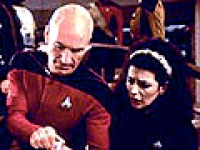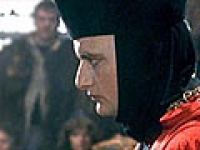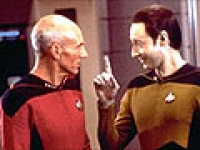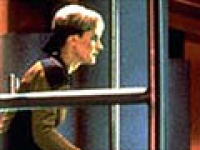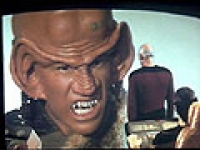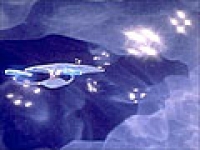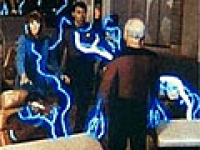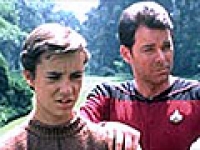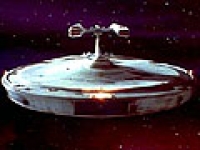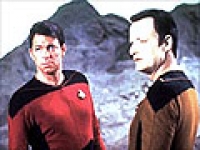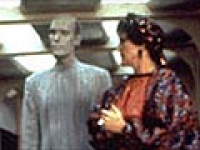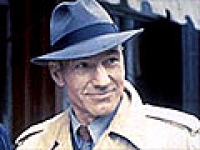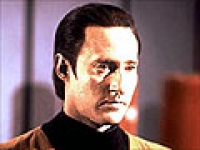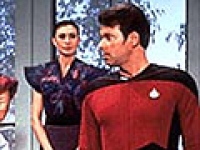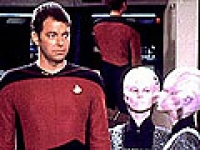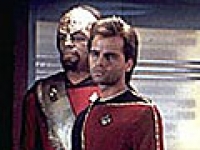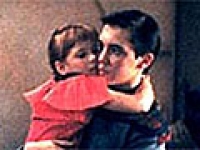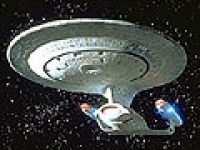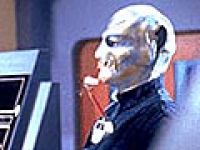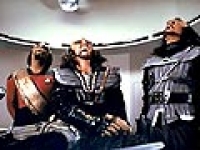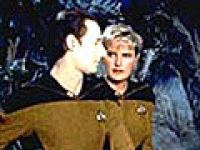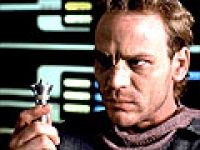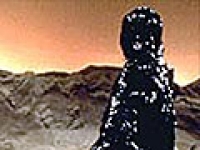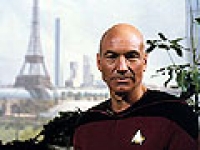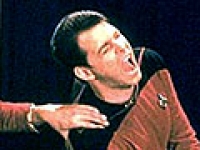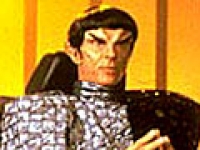Star Trek: The Next Generation — 1x01 — Encounter At Farpoint, Part I
Synopsis
The new U.S.S. Enterprise and its crew set out "to boldly go where no one has gone before."
Filler rating: not filler
Introduces numerous characters and plot threads that continue throughout Star Trek going forward.
Remarkable scenes
- The first sight of the Enterprise-D.
- Data listing the synonyms for snooping.
- Data reciting dialog in Picard's and Q's voices.
- Picard: "I'm not a family man, Riker, and yet Starfleet has given me a ship with children aboard. And I don't feel comfortable with children. But since a captain needs an image of geniality, you're to see that's what I project."
- Geordi regarding his visor: "It's a remarkable piece of bio-electronic engineering by which I quote 'see' much of the EM spectrum ranging from simple heat and infrared through radio waves, etc, etc and forgive me if I've sat and listened to this a thousand times before."
- McCoy's visit to the Enterprise-D and his interaction with Data.
Review
Set in the 24th century, almost a century after TOS, Star Trek: The Next Generation looks quite different and more modern than TOS. This much-needed update to the aesthetics not only looks fantastic, it was also transitioned to remarkably smoothly. The transition from TOS, to the films, to TNG was a slow, step-by-step evolution of the 23rd century TOS aesthetic into the new 24th century aesthetic. While the new TNG look is certainly quite different, you can trace its visual design lineage back to TOS in a number ways. In this way, TNG is not a reboot, but a respectful continuation of a now epic story; a sentiment that couldn't have been expressed better than to have an aged McCoy pass the torch to a member of the new Enterprise's crew. Quite a touching moment.
In addition to new aesthetics, this new century comes with a changed Starfleet. Gone are the days when the flagship was commanded by the brash, impulsive, even reckless at times Captain Kirk. The Federation has matured now. Exploration of space has become more rigorous and routine. Captain Picard reflects this new culture with his stern, rigid personality. Life aboard the Enterprise-D is a buttoned-down affair and even children like Wesley Crusher can't help but subdue their otherwise unbridled whimsy to stand in respectful awe of the professionalism and grandeur of the operation. Perhaps the most remarkable sign of societal progress as compared to TOS is that there's even a Klingon officer serving in Starfleet now, something that would be hard to imagine during Kirk's era.
But what fun would it be to watch the glorious Galaxy-class flagship sail through the ocean of space exploring the universe in the orderly, leisurely fashion that Captain Picard would have us do? That's where Q comes in. This delightful antagonist—as he is not quite a villain—is the avatar of everything Picard is not. Q injects chaos into Picard's perfect order and ugly nuances into Picard's rosy assessment of the progressive society that the Federation has built. Certainly Q is serving as mostly a troll under the bridge, and we can't quite know what motivates his trolling, but his arguments about humanity are not without their merits. And watching the fantastic actors Patrick Stewart (Picard) and John de Lancie (Q) duel each other in a battle of words is a great deal of fun.
Unfortunately the "god-like alien toys with the heroes" plot device has become quite the cliche on Star Trek by now, as TOS did this to death. However, Encounter at Farpoint still manages to be one of the best invocations of this cliche so far and Picard's steadfast resistance to Q's low opinion of humanity is certainly in the spirit of Star Trek.
Another wrinkle in the story is how the new fictional history of Earth interacts with established canon from TOS. We learn here that sometime after the eugenics war in the 1990s established on TOS, there was in fact another war referred to as the third world war which took place decades later. This would seem to contradict Spock's line in TOS: Space Seed that the 1990s eugenics war was Earth's "last world war." An unfortunately sloppy error in what is an otherwise reasonably strong, if somewhat slow-paced start to this new series.
Star Trek: The Next Generation — 1x02 — Encounter At Farpoint, Part II
Synopsis
Picard continues on with his mission to Farpoint hoping to prove to Q that humans are not a grievously savage race.
Filler rating: not filler
Introduces numerous characters and plot threads that continue throughout Star Trek going forward.
Remarkable scenes
- Picard to Worf: "Do you intend to blast a hole through the viewscreen?"
- Wesley's awkward interactions with Picard.
- Picard's private meeting with Beverly clumsily attempting to welcome her aboard properly.
- Picard solving the Farpoint mystery to Q's begrudged satisfaction.
Review
An intriguing difference from TOS seen clearly in the second part of Encounter at Farpoint is the clear establishment of long term plot arcs. The past relationship between Riker and Troi, Geordi's blindness, and Picard's history with Beverly and Wesley are all plot elements that clearly have more backstory and more developments left to unfold. In this regard, Encounter at Farpoint functions better as setup for future stories than it does as a story in its own right. Q's mystery of the space jellyfish was indeed, as Q noted, too easily solved. And the question of Q's precise motives for toying with the Enterprise crew leaves yet another mystery for a future episode to solve. While it is certainly nice to see the writers show a willingness to develop characters and plots over time which was exceedingly rare on TOS, a better story would've been more notable for its own developments rather than mostly for what it sets up for later.
The biggest flaw with Encounter at Farpoint is the pacing. So many scenes feel padded out unnecessarily to fill time. But there were other notable flaws too. One particularly cringeworthy feature of the episode is the romantic tension between Riker and Troi. They are heavily implied to have had some kind of romantic relationship in the past prior to their assignment to the Enterprise. After what was evidently a relatively amicable breakup, they are now flung back into each other's company unexpectedly by both being serendipitously assigned to the Enterprise. There's nothing wrong with that premise, but how it plays out in the episode leaves much to be desired, with the climax of absurdity being Troi not-so-subtly trying to nudge Riker into going into the underground caverns alone with her and then dropping even the pretense of subtlety when she has her "Don't! If you should be hurt!" outburst.
Troi and Riker both exhibited some unsavory characteristics of their own independent of each other too. It could perhaps go without saying that how Troi's empath powers were portrayed was quite lame. Watching her repeatedly exclaim, "Pain! Anger! Powerful mind!" is an exceptionally lazy way to do exposition, as it violates the principle of "show, don't tell." Heightening the irritation of watching these scenes is the silly degree of overacting that Marina Sirtis brings to the table for them. But we should place the majority of the blame on the writing here, not the acting. Her worst line was clearly an example of bad writing, not bad acting: "I'm only half Betazoid. My father was a Starfleet officer." She says this as if it goes without saying that her father could not be Betazoid if he was in Starfleet; as though those things are mutually exclusive. This strangely contradicts the idea that anyone can be in Starfleet, even a Klingon.
For Riker's part, his scene with Data on the holodeck was especially awkward as well, mostly for Riker's remarks, but partly for Data's as well. Mostly the problem with the scene is Riker's weirdly anachronistic prejudice directed at Data. While it was nice to see Data call him on it, it's surprising to see the show assassinate one of its main characters by depicting him as bigoted out of the gate. But then it gets even weirder when Riker responds to Data's remark about prejudice by interpreting it to mean that Data thinks he's superior, after which Data bizarrely agrees, in fact, he does consider himself superior. Yeesh. The whole point of depicting a multiracial, multispecies society like the Federation that was forged out of the crucible of the eugenics war and the "post-atomic horror" of a third world war is that by the 24th century, people should be beyond these kinds of shallow bigotries. But apparently Riker still has some lizard brain left to beat back. No wonder Q found just cause to test to see if the Federation was still "grievously savage" or if it had evolved beyond its animal instincts.
In any event, despite some awkward moments, Encounter at Farpoint is still a pretty strong story and a good start to a show that does indeed promise to be, as Picard put it, "much more interesting" down the road. Engage!
Star Trek: The Next Generation — 1x03 — The Naked Now
Synopsis
A mysterious contaminant causes the crew to act intoxicated.
Filler rating: not filler
Aside from serving as a sequel to the already nonfiller episode TOS: The Naked Time, this episode also has essential character development for Data and Tasha Yar which will be quite relevant in later episodes.
Remarkable scenes
- Data correcting Riker about whether something is blown out or sucked out regarding explosive decompression.
- Data noting that he is listed in several bio-mechanical texts.
- Data confused by the "snoot full" expression.
- Data: "There was a rather peculiar limerick being delivered by someone in the Shuttlecraft bay. I am not sure I understand it. 'There was a young lady from Venus; whose body was shaped like—'" Picard: "Captain to Security, come in!" Data: "Did I say something wrong?" Worf: "I don't understand their humor either."
- Yar's sexual encounter with Data.
- Picard and Beverly drunk.
- Data drunk.
Review
This homage to TOS: The Naked Time is about as effective as the original. In some ways better, in other ways worse. Like the original, we get a chance to unmask the characters' innermost desires in a largely amusing way. Geordi's desire for normal sight is a particular highlight. Like the original though, the framing device strays into cringeworthy territory at times. The best example of this contradiction is the portrayal of Tasha's intimacy issues. While it's understandable that someone who grew up surrounded by "rape gangs" and spent years struggling to escape would have some intimacy issues to work through, the narrative trivializes her experiences by making a goofy comedy out of them. While these scenes add depth to both Tasha's and Data's characters, the subject probably should've been depicted with a bit more seriousness. Another small detail which exemplifies this lack of polish is Tasha's line to Troi about how she "always" wears "the most beautiful clothes off duty," which is a curious remark given that Troi seems to inexplicably wear such casual attire all the time now, even when on duty.
Wesley's part of the story was problematic too. For starters, it is not explained why nobody bothered to just phaser blast a hole through the window to get to Wesley sooner. Much more problematic though is having so many characters praising Wesley at the end of the story for saving the ship when he arguably caused most of the danger to begin with by taking over Engineering. Without Wesley's interference, the Enterprise would certainly not have had such a close call, and it's also possible the Tsiolkovsky may not have been destroyed. Sure, it's true everyone including Wesley was under the influence of the contaminant, but the that doesn't fully excuse his actions. The contaminant merely lowered Wesley's inhibitions. It did not fully control him. As such, while punishing him for behaviors he engaged in while under the influence would have been unfair, so too is praising him for the equally rash actions that incidentally saved the ship from the crisis he played a large role in creating.
Star Trek: The Next Generation — 1x04 — Code of Honor
Synopsis
Tasha is kidnapped.
Filler rating: bad filler
There is some stuff here which foreshadows Wesley's more prominent role as a member of the crew later, but none of it is essential viewing.
Remarkable scenes
- Data correcting Picard regarding what century the gift originates from.
- Picard's irritation with Beverly wanting to discuss Wesley.
- Picard giving Wesley a chance. "Sir?" then, "Sir?" then Picard says, "Is the whole ship deaf?"
- Data offending Picard when discussing the French language.
- Riker being carefully talked into agreeing that Picard should lead the away team.
- Picard rambling on "about something everybody already knows."
Review
There is a decent idea for a story about diplomacy here, but it's buried beneath a lot of bad stylistic choices. It's pretty hard not to see the Ligonians as racist stereotyping and the conflict surrounding Yar as sexist stereotyping, particularly the scene where Data described the weapons as so light that even women could use them. Some smaller stylistic choices were awkward too, such as Data of all people tripping over his words with the "includling" line; a vocal mistake that is hard to suspend disbelief on, Beverly's unprofessional panicking about the vaccine, and a series of scenes with stilted dialog that the actors were clearly stumbling over. While the episode does have a few nice details and a few amusing scenes, what we have here is unfortunately mostly cringeworthy.
Star Trek: The Next Generation — 1x05 — The Last Outpost
Synopsis
The crew encounters Ferengi bandits.
Filler rating: bad filler
While this is the first appearance of the Ferengi, it is not necessary to see this episode to understand later episodes, even Ferengi-centric episodes.
Remarkable scenes
- The Chinese finger trap scene.
- The Ferengi expressing disgust at "clothed females."
Review
Another stylistically awkward episode, but not as bad this time. The Ferengi are thought to be a serious threat at first, but it turns out that they were merely posturing to appear more threatening than they actually were. In reality they are mostly harmless and totally ridiculous. Meanwhile, yet another godlike alien shows up and also appears to be a serious threat at first, but is soon mollified by Riker answering a few riddles. Riker then gets all chummy with this "guardian of the Tkon Empire" who for some reason isn't all that broken up about having slept through the demise of his entire nation.
Contented with having an insufferably smug conversation with Riker about the inferiority of the Ferengi right in front of them, the guardian then disarms the automated weapon that disabled both the Enterprise and the Ferengi ship, then makes known his intent to return to his everlasting coma, possibly never to be seen again by anybody ever. Okay. Right. Sure.
Clearly these parallel scary aliens who turn out not to be so scary after all were meant to mirror TOS: The Corbomite Maneuver, one of TOS' less savory episodes. This episode manages to only slightly improve on the original's formula by having slightly less terrible pacing. It appears they also wanted to evoke TOS by beaming over the Chinese finger traps to the Ferengi ship. This is similar to how Scotty beamed over the tribbles to the Klingon ship in TOS: The Trouble with Tribbles.
Setting aside Star Trek's oft-overwrought stylistic choices though, there are some nice details here. It's nice to see the Ferengi make an appearance, who were first mentioned in Encounter at Farpoint. The designs of their ship, alien makeup, and their weapons were memorable too. And while their function as a caricature of capitalism was as overwrought as most of the rest of the episode, the idea of portraying a less socialist and more capitalist version of the Federation on Star Trek is intriguing. As such it would be well worth exploring the Ferengi in more depth later, though next time hopefully less childishly.
Star Trek: The Next Generation — 1x06 — Where No One Has Gone Before
Synopsis
The crew is sent a billion light years from their own galaxy.
Filler rating: not filler
This episode is essential viewing for Wesley's character development.
Remarkable scenes
- Kosinski's incredibly obnoxious behavior.
- Picard walking out into space from the turbolift.
Review
While this is yet another not-so-subtle nod to a TOS episode—this time to TOS: Where No Man Has Gone Before—this time the rehash is far superior to the original. Even the title reflects careful refinement: replacing the word "man" with "one" in the title of the episode (just as was done in the opening theme of TNG versus TOS) is an explicit rebuke of the accidental(?) sexism of TOS' popular catchphrase "where no man has gone before."
In the original take on the story, Gary Mitchell embodied both Kosinski's obnoxiousness and the Traveler's superpowers in a single person. Separating these two qualities into two different characters and misleading the characters into thinking Kosinski had real talent only to be outed by Wesley was a nice touch. The foreshadowing about Wesley possibly having the potential to develop the Traveler's superpowers himself some day is also an intriguing piece of character development for him; as was Picard deciding to make him an acting ensign and encouraging him to go to the academy.
The metaphysical stuff about thought becoming reality at the edge of the universe worked considerably less well. Star Trek is not exactly at its best when it delves into this new-agey quasi-religious mumbo jumbo as a plot device. And once again we have yet another non-corporeal somewhat godlike alien. All things considered though, this is the best episode since Encounter at Farpoint.
Star Trek: The Next Generation — 1x07 — Lonely Among Us
Synopsis
Alien beings take control of Crusher, Worf and Picard.
Filler rating: good filler
There's no essential plot or exposition in this episode that renders it unskippable, but it's a decent episode, even though it could have been better.
Remarkable scenes
- Data mimicking Sherlock Holmes.
- Picard's creepy behavior while possessed.
- The senior officers plotting a mutiny.
Review
This episode is like a less good version of TOS: Journey to Babel. Instead of rehashing that terrific episode, the more interesting story about the conflict between the two alien delegations is largely ignored so we can have yet another energy life form of the week.
There is a scene early on that about perfectly sums up the level of effort put into conceptualizing this story: when Worf freaks out while receiving medical attention, Beverly asks the injured crewman who tried to help restrain him, "Are you okay?" He never responds and doesn't move much but she doesn't seem to care. She's on autopilot helping Worf. She only pays lip service to that minor character over there.
That's how we should imagine the writers felt about this episode too. It's like they were on autopilot repeating the tired energy life form formula ad nauseam and like Beverly being too checked out to pay any real attention to her comrade, the writers were too checked out to pay any real attention to the subplot.
This story isn't without its charms though. Picard possessed was highly entertaining, as was Data's goofy embrace of Sherlock Holmes. It's a shame they didn't let the two alien delegations be the main plot instead of the subplot. Having Data put on the Sherlock Holmes persona to solve a conventional murder would've been a much more fun episode.
Star Trek: The Next Generation — 1x08 — Justice
Synopsis
Wesley is sentenced to death.
Filler rating: bad filler
Pretty lame episode with no significant long term continuity.
Remarkable scenes
- Worf: "Nice planet."
- Worf's statement that he would have to restrain himself during sex with a human woman so as not to injure her and Riker's amused reaction.
- Picard: "Data, don't babble." Data: "Babble, sir? I'm not aware that I ever babble, sir. It may be from time to time I have considerable information to communicate and you make question the way in which I organize it..."
- Data offending Beverly with his fascination over her panic about Wesley's predicament.
Review
The crew enjoys some shore leave on yet another planet whose alien inhabitants look exactly like humans. Picard finds that detail oddly remarkable, but by now we have so many similar examples. The unimaginative blandness of the Edo is further compounded when it turns out they are mindless pleasure zombies exhibiting behavior so shallow it's hard not to spend half the episode groaning at that alone. But worry not, there is plenty else to groan about. Not the least of which is their asinine criminal justice system.
The idea that the Federation should be high-minded enough to respect the local laws and customs of the sovereign nations they visit is a good premise for a story, but it's explored in a mostly sloppy way here. For starters, just visiting the planet to begin with was a violation of the Prime Directive, since they were clearly not a spacefaring civilization. Despite that the Edo seemed oddly aware of the existence of other civilizations, or at least totally unsurprised to receive visitors from outer space.
But even leaving all that aside, the Edo's policy of randomly executing people for trivial and even accidental violations of law—but only sometimes when that law is deemed punishable today by the roll of the dice—is the stupidest idea for a criminal justice system ever. It lacks both consistency as well as justification for the lack of consistency. For any kind of enlightened system of criminal justice to make sense, there has to be equality under the law. And in cases where the law is applied unequally, there tends to be some kind of underlying societal motive, like systemic discrimination, or simply the arbitrary whims of a cruel ruler.
But such motivations are not present here. Instead, the Edo just seem uniformly idiotic. They can't figure out a way to enforce their laws uniformly, so they just do it randomly and don't see any problems with that whatsoever. Given that, it's no wonder Picard chose to violate the Prime Directive to be rid of these people. Their local laws and customs are so idiotic that they simply don't deserve to be respected. The Prime Directive was dreamed up by someone who never expected alien civilizations to be this stupid.
That said, watching Picard wrestle with the ethics was still pretty compelling. It would've been nice if such scenes were set to the backdrop of a more compelling moral dilemma, but they were still well executed all the same. And despite how overwhelmingly lame the Edo were as a concept, watching the crew make the most of the experience certainly resulted in a series of pretty amusing, if at times overly goofy scenes. So while most of this episode is pretty painful, it's somewhat offset by some good stuff here and there.
Star Trek: The Next Generation — 1x09 — The Battle
Synopsis
Picard encounters his old ship, the Stargazer.
Filler rating: partial filler
This episode shows the oft-mentioned but never seen elsewhere Stargazer. Seeing it is not essential continuity, but it's kinda nice to have texture. This episode is also a prerequisite to watching TNG: Bloodlines, but since that episode is filler, that doesn't heighten this episode's essentiality much. But definitely watch this episode first if you plan to watch TNG: Bloodlines.
Remarkable scenes
- Riker labeling Data as "second hand" merchandise.
- Kazago: "As you humans say, I'm all ears."
- Wesley finds the answer to Picard being mind controlled and receives no gratitude! Hilarious.
- Kazago informing Riker that he's relieved Bok of his command.
Review
This is a fun exploration of Picard's past. It's always nice to see another side of Starfleet and to get a good look at another class of starship, this time the Constellation class. In a nice bit of attention to detail, the Stargazer's design was a smooth transitional mishmash of design elements from the TOS films and the current TNG designs. Likewise Riker and Kazago play off each other quite well. The rapport that the two first officers seemed to innately share with each other was most satisfying; a nice counterpoint to the conflict between Bok and Picard.
What worked less well was the pacing. While this episode isn't as poorly paced as some earlier ones this season, it would have been far more interesting if such a large percentage of it wasn't dedicated to the buildup to Picard's mind controlled abduction. This unusually prolonged exposition was exacerbated by Picard and Beverly repeatedly discussing his headaches but spinning their wheels on getting to the bottom of it. We could've done with fewer of those scenes.
A better story would have gone into more depth about Picard's time on the Stargazer, perhaps giving us more direct flashbacks and fleshing out the other officers aboard that we see only briefly. If they wanted to go for all the marbles, they could've found a way to work in a scene depicting the death of Wesley's father while Picard was struggling with his guilt over mistakes of the past more generally. It also would've been nice if Picard had had more direct conflict with Bok rather than all this cloak and dagger stuff.
By the end, Bok's character was never quite properly fleshed out, nor his motives all that well thought out. Indeed, his first officer quite effortlessly deposes him for that reason. There are other wrinkles in the story too. It's not entirely clear why the Ferengi from The Last Outpost were unreadable by Troi's empath powers while Bok's mind was totally open to her. Moreover, it's never established why the Stargazer survived the battle. Why would anybody abandon a perfectly good starship? Did Picard mistakenly assess it as unsalvageable or something? This should've been more explicitly explained.
All things considered though this is one of the strongest episodes of TNG so far.
Star Trek: The Next Generation — 1x10 — Hide and Q
Synopsis
Q invites Riker to join the Continuum.
Filler rating: not filler
Lots of exposition about Q here that is important in later episodes.
Remarkable scenes
- Q: "Your species is always suffering and dying."
- Q calling Worf "macro head with a micro brain."
- Q and Picard quoting Shakespeare.
- Worf regarding the "French" soldiers: "More like vicious animal things."
- Q appearing in Data's makeup and costume.
- Worf and Wesley briefly dying, then Riker using the power of the Q to undo it.
- Data casually throwing heavy debris around.
- Riker refusing to resurrect the little girl with the power of Q.
- Picard: "What is this need of yours for costumes, Q? Have you no identity of your own?"
- Worf's reaction to Picard accusing Q of being a "flim-flam man."
- Geordi: "Worf, is that your idea of sex?"
- Picard confirming that yes, Riker should feel like an idiot for everyone refusing his supernatural gifts.
Review
Here we're given a clearer motivation for why Q is so interested in humans, where he comes from, and what his relationship to the rest of his species is. It seems Q is a renegade of sorts, or at least an oddball among his own people. His fascination with humans might perhaps be his own, as it appears that his people yanked him away just as he attempted to break his word to Picard. The idea that humanity's evolution is uniquely trending towards abilities comparable to the Q and could perhaps some day pose a threat to them is also an intriguing revelation. This certainly explains why Q would be so fascinated by humans and so apparently uninterested in every other species.
Riker's story worked less well. Being so tempted by the power of the Q so easily seemed a bit out of character at times, though it was certainly satisfying to see him get somewhat humiliated at the end of the story. The highlight of the episode—aside from John de Lancie's incredibly entertaining performance as Q of course—was Riker's refusal to use the powers of the Q to save the dead girl. A heart-wrenching moment that demonstrates the spirit of Star Trek in a dark, touching, and necessary way. Picard's insistence that humanity isn't ready to wield the power of the Q shows the Federation is enlightened enough to apply the Prime Directive to itself, not just to others.
A solid episode.
Star Trek: The Next Generation — 1x11 — Haven
Synopsis
Lwaxana Troi tells Deanna of her arranged marriage.
Filler rating: partial filler
Lwaxana is a recurring character on TNG and DS9 but her appearances are more nice to haves than essential. Watch this episode if you want to follow the Lwaxana arc, but technically no single episode Lwaxana appears in is unskippable.
Remarkable scenes
- Lwaxana is so wonderfully arrogant.
- Wyatt and Troi discussing Betazoid marriage ceremony compromise.
Review
This episode has bland plotting that seems to have been strung together from a series of totally unrelated threads. The episode's name is "Haven" and yet we see virtually nothing of the planet nor do we learn anything about its people beyond the fact that they're friends of the Federation. Then we have the Tarellians, an intriguing concept for what could happen to a civilization that employs biological weaponry and can't control the fallout, but we don't get any depth beyond surface details.
The worst and unfortunately most prominent feature of the story is Wyatt being summoned across the vastness of space due to some sort of psychic connection to Ariana. Aside from being yet another lame use of quasi-religious mumbo jumbo as a lazy sci-fi plot device, there is some additional oddness in the story caused by the fact that the only reason Wyatt could confuse the woman of his dreams with a Betazoid to begin with was due to the fact that Betazoids and Tarellians look identical to each other and also once again identical to humans as well.
By now it is quite odd that nobody seems to find it at all strange that so many alien species look exactly like humans. TOS had this problem too, but TNG's continual compounding of it adds layers of ridiculousness. The height of absurdity here is the fact that we can't actually conclude one way or the other whether or not the inhabitants of Haven are human. Is it a human colony not under the jurisdiction of the Federation? Are they a recurrence of one of the countless previous human-like aliens we've seen from past episodes of TOS and now on TNG too? Are they some new alien that also looks exactly like humans? Who knows! There's no way to know.
What does work well here is the drama surrounding Troi's relationship with Riker and Wyatt. Their scenes are all reasonably compelling and it was also nice to see Betazoid culture fleshed out more. Likewise, Troi's mother Lwaxana was certainly a memorable character for better or worse. Had their story been told against a less horribly lazy alien threat backdrop, it would've turned out better.
Star Trek: The Next Generation — 1x12 — The Big Goodbye
Synopsis
Picard and crew are trapped on the holodeck.
Filler rating: good filler
While this is the first episode to feature the Dixon Hill holodeck program, watching it is not necessary to understand the context of the program's reuse when it recurs in later episodes.
Remarkable scenes
- Picard doesn't know what Halloween is.
- Picard's fascination with holodeck detail, such as the cars and his excited ranting about the experience afterward to his senior staff when they're supposed to be having a briefing about their diplomatic mission.
- Everyone reacting to the holodeck so carelessly until they realize things are messed up.
- Beverly swallowing gum.
- Picard with a cigarette.
- Data with a lamp not realizing he unplugged it. When it gets plugged back in for him, the look on his face suggests oblivious self-satisfaction and a belief that he fixed it himself. Hah.
- Picard's last minute performance in insectoid language is fantastic.
Review
Encounter at Farpoint teased us with the promise of a real holodeck adventure someday and we finally get one here. In many ways this episode feels like a mostly successful rehash of TOS: A Piece of the Action, but the holodeck definitely puts a different spin on it. It was certainly intriguing that the characters in the holonovel were capable of becoming aware of their status as fictional characters, or at least their status as existing in a world that is layered atop another world.
But while that stuff was definitely solid, the episode missed a huge opportunity with the alien subplot. The alien of the week was a pretty unique concept and it's a real shame we didn't get to spend more time with them, or even see them. An insectoid alien (finally an alien that doesn't look like humans!) that has a unique language the universal translator can't deal with? Or perhaps the aliens insist that the universal translator be shut off as a weird gesture of respect? That sounds like a great story by itself, but it was totally an afterthought here.
That said, the enthusiasm the characters had for the fun romp they were having was infectious. As such this episode is pretty good fun to watch.
Star Trek: The Next Generation — 1x13 — Datalore
Synopsis
Data meets his evil twin brother, Lore.
Filler rating: not filler
Lots of exposition about Data here that is important in later episodes.
Remarkable scenes
- Data's off switch.
- The helm control tutorial detailing that space is not flat like an ocean and that one can fly up, down, diagonal, etc was a nice touch.
- Lore revealing the truth about his background in Data's quarters.
- A notable use of slang: Geordi: "Captain, I'm picking up a bogey coming in on a five o'clock tangent."
- Dr. Crusher running away on fire after getting phasered.
- Wesley beaming Lore off the ship.
Review
This episode was a clever, fascinating character piece for Data, a character who up until now has been quite mysterious and unusual. Data was apparently constructed by a famous scientist known as Dr. Noonian Soong who had long promised the invention of a viable positronic brain, a concept originally conceived by science fiction writer Isaac Asimov, who Yar references directly. His work had apparently been long regarded as fruitless because word of the invention of Lore then later Data had not spread beyond his home colony. Dr. Soong had apparently disassembled Lore and began work on replacing him with Data after Lore's behavior turned out to be disruptive, but not before Lore had managed to summon the crystalline entity to wipe out the colonists. Data was left out in the open to be found by Starfleet (specifically the starship Tripoli) some time later while Lore was hidden away so as to do no further harm. At least until Geordi discovered Dr. Soong's secret lab...
In addition to the episode being loaded with wonderful tidbits and details about Data's construction and history, it is simply a pleasure to watch Brent Spiner play both Data and Lore. This take on the evil twin story compares quite favorably with William Shatner's performance in TOS: The Enemy Within, but not everything in the story is as well done. They could've stood to tone down Lore's overwhelming malevolence a bit. Good villains give us compelling reasons to believe why they're the heroes of their own stories, but we don't ever get a clear reason why Lore wanted to please the crystalline entity so much. There may be no reason other than sadistically wanting to destroy the community that rejected him.
Another curious plot point was the obsession with Lore using contractions and Data not using them when in fact we've seen Data use contractions many times before. He said "can't" in Encounter at Farpoint, "that's" in The Naked Now, and "I'm" in several episodes like The Last Outpost and Justice. Data also quite conspicuously uses "I'm" at the end of the episode, perhaps a deliberate choice on the part of the writers to show that Data has become more human as a result of this experience. Regardless of the intent of the writers, the presentation of this plot point is clumsy. It would've been better to simply say that Lore had a stronger, more informal command of language than Data. Not say that Data doesn't use contractions, but that he uses them infrequently because his language is frequently overly formal making him appear more artificial and less human.
Lastly, Picard's treatment of Wesley in this episode was strangely inappropriate, particularly after The Traveler had told Picard that Wesley is unusually smart and perceptive in Where No One Has Gone Before. You'd think people would put more stock in Wesley's intuitions after that or at least hear him out before barking at him to shut up. Overall though this is one of the strongest and most memorable episodes of the season so far.
Star Trek: The Next Generation — 1x14 — Angel One
Synopsis
The crew travels to a planet with a matriarchal society.
Filler rating: bad filler
Pretty lame episode with no significant long term continuity.
Remarkable scenes
- Riker submitting to local apparel and refusing to consider it degrading over Troi's and Yar's objections.
- Sick Picard humbly and reluctantly obliging to the doctor's orders.
- Geordi in command and loving it. "Make it so."
- Worf sneezing.
- Riker's martyr speech.
- Data's facial expression when Riker gives him a pat on the shoulder.
- Picard's hoarse voice.
Review
This is a pretty painful episode to watch for a number of reasons. Once again the aliens shown here are yet another alien race that looks exactly like humans, complete this time with characters who have western names like Ariel and Trent. They were so indistinguishable in fact that when the Enterprise wanted to find the Odin survivors, they had to resort to searching for an element not natural to the Angel One world rather than just using the sensors to find non-human life signs. The distinction that they evolved in such a way that their women are bigger and stronger than their men due presumably to millions of years of matriarchy altering the dynamics of their natural selection process is a reasonably plausible and interesting story idea to explore in an alien civilization, but whatever story potential there was in exploring such a premise was undermined considerably by its sexist portrayal, not unlike what happened in Code of Honor.
Another issue was the muddled portrayal of the Prime Directive. It isn't clear why the Federation maintains any sort of contact with Angel One at all given that it doesn't appear to be a spacefaring civilization. It was stated that the planet's location was strategically important, so perhaps the Federation made an exception to the Prime Directive when establishing diplomatic relations 60+ years ago, similar to what might've gone on in TOS: Friday's Child. But that isn't the only Prime Directive complication here. In contrast to how previous episodes defined the Prime Directive, Data and Riker make a big point about how it apparently only applies to Starfleet personnel, and apparently not to individual Federation citizens. This is a completely nonsensical distinction. A law like that would be as idiotic as if the Indian government passed a law prohibiting contact with the uncontacted North Sentinelese tribe, but only applied the law to agents of the Indian government, excluding ordinary citizens for some reason, which is not the case for fairly obvious reasons.
These wrinkles do much to wreck what is otherwise a fairly fun episode. The virus B plot and the Romulan C plot were both fairly compelling. A better episode would've focused on that exclusively. Plus how can we not be charmed by Geordi in command and loving every minute of it?
Star Trek: The Next Generation — 1x15 — 11001001
Synopsis
The Bynars take control of Enterprise.
Remarkable scenes
- The Bynars working aboard the Enterprise.
- Worf taking the Parises Squares game so seriously.
- Riker: "Keep notes. This may be valuable to scholars in the future." Geordi: "Really?" Riker: "Well think about it. A blind man teaching an android how to paint? That's got to be worth something in somebody's book."
- Riker playing with the settings of the woman on the holodeck.
- Minuet and Picard talking in French.
- Data "awaiting inspiration."
- Picard and Riker valiantly trying to save the ship.
Review
Riker's jazz indulgences along with Picard and Riker being seduced by the holodeck was a bit overused in this episode. And I'd have preferred it if we learned more about the Bynars. Still, this episode is a real action packed and highly interesting thriller. The technobabble at the end is annoying, but the episode is still largely entertaining and, well, just good. The greatness of the episode largely overwhelms its minor flaws.
Star Trek: The Next Generation — 1x16 — Too Short a Season
Synopsis
The crew encounters legendary negotiator Mark Jameson.
Remarkable scenes
- The Admiral's wife's Jealousy yet her contradictory desire NOT to acquire her husband's newfound youth is so perfect.
- The Admiral's "interpretation" of the Prime Directive is great.
- Data: "Their phasers sir, they're set to kill." Picard: "Thank you Mr. Data, I have heard that sound before."
Review
A most unremarkable and dull episode. The one-two combo of an annoying guest and the total lack of a secondary plot makes the episode seem to drag. In much the same way of many bad original series episodes, this episode takes itself way too seriously which further makes it unpalatable. I feel like the whole time I'm watching the episode, I'm supposed to care about it far more than I do, which detracts from the experience even more. Beyond that, the usual round of cliches. An alien race that looks exactly like humans and a high ranking starfleet official does something stupid. Quite a stinker.
Star Trek: The Next Generation — 1x17 — When The Bough Breaks
Synopsis
Wesley and the other Enterprise children are kidnapped.
Remarkable scenes
- Picard making up regulations on the spot and Data realizing it.
- Picard: "Data, find a way to defeat that shield." Data: "That may be impossible, sir." Picard: "Things are only impossible until they're not!" Data: "Yes sir." Then data gets this wonderfully puzzled look on his face.
- The various Picard-being-tortured-by-contact-with-children scenes.
Review
Another identical-to-humans race. Somehow the children the Aldeans stole are going to continue their society. Obviously not genetically. So Aldea is to become a paradise for humans then in a few generations? The guest cast parents were overacting badly. Thankfully their screen time was short. And Raschala demands to keep the little girl? So much for their species being humble and non-greedy. Also, usually Wil Wheaton was great at playing Wesley, but he didn't do so well in this episode. Who knows, maybe the directing sucked or the guest cast/children were causing him issues. Wesley is actually pretty good usually. Some of the logic behind how the ozone atmosphere layer connects to the cloaking shield is a bit fuzzy, but acceptable with some liberal interpretation. My problem with this episode is mostly due to the premise. The method by which the premise played out was simply the nail in the coffin. Cliches, bad guest acting, idiotic aliens, and even a regular character did a bad job.
Star Trek: The Next Generation — 1x18 — Home Soil
Synopsis
Data and Geordi discover a "microbrain."
Remarkable scenes
- Data dodging and eventually destroying the drilling laser.
- Worf, facing Geordi: "But is it alive?" Computer: "Probability high." Worf, facing computer terminal: "I wasn't asking you."
- The aliens referring to the crew of the Enterprise as "ugly bags of mostly water."
Review
This episode, like the previous one, but less so, is dull and annoying. Plot-wise, it's fairly average, but some remarkable oversights drag this episode down a bit. Firstly, in an episode all about terraforming, I would have wanted to see some information about the Genesis device presented in this episode. Even though it was probably declared a failure and disregarded, for continuity's sake it would have been interesting to see it talked about. This is not necessarily a technical problem; it makes sense that the details concerning the events surrounding the testing and use of the Genesis device were probably classified and buried after the events of the original series films. More annoying is how surprised everyone was acting regarding inorganic life. Clearly the events of TOS: The Devil in the Dark are not classified. That episode should most definitely have been referenced. Beyond this, there is little to distinguish this episode. The acting of the guests was of unusually high quality and the overall idea behind the episode was interesting, if rehashed. However I tend to prefer TOS' version of this episode far more. The inorganic aliens of this episode, when they finally got a chance to play a role, weren't that interesting and I found the monotone translations of the universal translator unnecessary. Overall, this episode largely failed to live up to its potential.
Star Trek: The Next Generation — 1x19 — Coming of Age
Synopsis
Wesley takes the grueling Starfleet Academy entrance exam.
Remarkable scenes
- Worf and Wesley's chat about the testing is great.
- Picard saving Jake by talking him through the shuttle maneuver.
- Wesley's psych test.
Review
This episode is kind of a mixed bag. First the bad. Both the conspiracy and the starfleet testing in this episode seemed highly unrealistic. But if we set that aside, we've got plenty of good as well. This episode has great continuity with previous episodes regarding Remmick's interrogations. Wesley getting pissed during the test was a little strange. "Do you want this to become violent?" That was a little too far. But acceptable. The best part of the episode is during Remmick's interrogations of various crewmembers in the briefing room. The way they wove the Remmick's questions and the answers of different crewmembers together was great. And Picard is getting noticeably better with children. I liked him with Jake and later with Wesley.
Star Trek: The Next Generation — 1x20 — Heart of Glory
Synopsis
Klingon fugitives take over the Enterprise.
Remarkable scenes
- Seeing through Geordi's eyes was fascinating. I was just as disappointed as Picard when the questioning about Geordi and his VISOR was forced to cease.
- The dialog between Worf and the guest Klingons is great.
- Our first sight of the Klingon death ritual. Data's later explanation of the Klingon death ritual is just as good.
- The Klingons escaping the brig is excellently done.
Review
The opening was highly thrilling. Especially with Geordi transmitting his visuals and the discovery of the Klingons. The rest of the episode plays out just as well. Only the antagonist Klingons' battle desires are nonsensical. But it doesn't hurt too much. This episode is a real thriller and a first season classic.
Star Trek: The Next Generation — 1x21 — The Arsenal of Freedom
Synopsis
The crew investigates the disappearance of the U.S.S. Drake.
Remarkable scenes
- Riker: "No. The name of my ship is the Lollipop." Paul: "I have no knowledge of that ship." Riker: "It's just been commissioned. It's a good ship." The entire scene is remarkable.
- Notice how the second Riker is incapacitated, Picard takes the opportunity to plunge himself into immediate danger on the planet? Something Riker would certainly object to? The counselor objects, but PIcard doesn't seem to care.
- I liked the scenes with Geordi and Chief Engineer Logan. At first it seemed shallow but it grew on me.
- The scenes with the Doctor coaching Picard on on-the-fly medicine were extremely well done.
- Geordi and Troi's scene together is also well done.
- Riker regarding Data jumping: "Data, it's over ten meters!" Data: "11.75, commander." Yar: "Data, you may be sturdy, but not indestructible!"
- Geordi: "Relinquishing command, captain." Picard: "As you were, lieutenant." Geordi: "Sir?" Picard: "Mr. LaForge, when I left this ship it was in one piece. I would appreciate your returning it to me in the same condition. Do you concur number one?" Riker: "Absolutely, sir."
Review
Excellent character development of Beverly and Geordi. Excellent performances by everyone. Every character had a good showing and a worthwhile purpose. Even the guests were great except for maybe Chief Engineer Logan. But he was only slightly annoying. (See problems.) One of the best of the first season. I don't like the premise nor the plot so much as I like the execution. This episode is a great example of how a mediocre idea can be made great by a good implementation. A pity that other episodes of this season with great premises couldn't have been better implemented and so exciting.
Star Trek: The Next Generation — 1x22 — Symbiosis
Synopsis
Picard mediates a dispute involving a mysterious drug.
Remarkable scenes
- I don't know why, but I love the looks of almost disgust Picard and Riker and the rest of the crew give each other when the freighter Saction's crewmembers speak over the hail.
- That natural electrical charge sure is handy. Yar and Riker's discussion on it is also nicely done and technically correct.
- I love the initial plague fear at the beginning of the episode before they know it's a narcotic.
- Data: "I would estimate four billion, three hundred and seventy five million--" Picard, interrupting: "Thank you Mr. Data."
- Yar and Wesley discussing drugs.
- Riker being electrocuted, the look on his face, Picard refusing to back down, the whole scene was amazing.
- Picard disgusted at the end: "Just put some distance between us and this system."
Review
A narcotic somehow maintains an economic balance between two groups of people. How many times have we seen this in our own history? And even today? Some say that cigarettes are "the stupid people tax," seeing as how the U.S. government taxes them heavily. They tax the "stupid people" and redistribute the money to better causes by funding schools, road maintenance, and other tax funded things. Many smokers say to non smokers, "if we didn't smoke, where would all that tax money come from?" A similar dilemma is presented in this episode. Without the revenue generated from the narcotic in this episode, the producing species would supposedly not have a way to sustain themselves. The problem with that argument is that it's a cop out--denial of the real problem by using a cheap short-sighted excuse. What these people are really saying is, "I don't want to change." If smoking was banned tomorrow, schools, roads, etc, would still get paid for. Taxes would simply be collected from elsewhere. And if this symbiotic narcotic relationship in this episode were to be instantly severed, which is essentially what Picard did, the two planets would eventually get over each other and learn to survive on their own. The given here is that overcoming narcotic addiction on a global scale is preferable to short term gains acquired by exploiting its production.
Star Trek: The Next Generation — 1x23 — Skin of Evil
Synopsis
A strange entity taunts the crew with vicious pranks.
Remarkable scenes
- Picard unrelentingly hounding the chief engineer.
- Tasha's death and the subsequent attempts to revive her.
- Notice how the second Riker is incapacitated, Picard takes the opportunity to plunge himself into immediate danger on the planet? (Again?) Something Riker would certainly object to?
- Data under control of the skin of evil.
- Riker all tarred. I bet Jonathan Frakes loved filming that.
- Data's commentary on the funeral.
Review
This episode is the result of Denise Crosby feeling that her character had become too "Uhura-like," meaning always present but underutilized. This forced the writers to kill off her character abruptly. I'm not opposed to the abrupt death of a main character, however the manner in which Tasha died in this episode was wholly disrespectful. She was quite literally offed by sentient slime without warning, without drama, and without even the narrative focus. The dramatic center of the episode briefly shifts over to Tasha after she's attacked, but with people still in danger on the planet there is no time to grieve. Instead, we're treated to more painfully acted scenes with the evil slime. Then, at the end of the episode, we're treated to a bizarre "play this if I died" recording that Tasha made, complete with up to date commentary regarding everyone in the room! Did she update her personally-written eulogy just before going on every away mission just in case? Quite morbid and unrealistic, just like the alien slime that killed her. The only reason this episode is rated as high as it is is because Tasha's death scenes and funeral (especially ending the episode with the funeral) managed to touch me despite the overall lameness of the episode.
Star Trek: The Next Generation — 1x24 — We'll Always Have Paris
Synopsis
Captain Picard is reunited with an old flame.
Remarkable scenes
- Picard's fencing match in the beginning.
- Picard: "Enough of this self-indulgence." Regarding his time on the holodeck.
- Picard's strange behavior on the bridge when he reaches his old girlfriend before anyone else know just who's down there.
- Picard, Data, and Riker meeting themselves from 5 seconds ago is awesome.
- Picard confronting his lost love regarding their unfinished business.
- Beverly fantasizing about Picard.
- Data navigating the obstacle course lab.
- Data talking to his three selves.
Review
What this episode lacks in its attempts to be profound it makes up for in being a great character story for Picard with a wonderful action sequence for Data. Even by now, stories about characters being reunited with "old flames" are becoming something of a cliche on Star Trek. It's not necessarily unrealistic that in the course of scampering across the galaxy that some of the characters would meet up with people they used to spend a lot of time with, but at the same time it strikes me as a somewhat unimaginative way to force character development out of an episode. I can't help but roll my eyes and say "oh, of course there's somebody Picard used to know on that planet!" Despite this, the episode was solid and entertaining, if a bit unrealistic at times.
Star Trek: The Next Generation — 1x25 — Conspiracy
Synopsis
Picard suspects conspiracy in Starfleet.
Remarkable scenes
- Data attempting to laugh.
- Data: "One can swim in moonlight?"
- Worf: "Swimming is too much like bathing." Apparently Worf hates being clean.
- Data: "In a manner of speaking, it is nothing but a lifeless hunk of rock. A useless ball of mud. A worthless chunk of--" Riker: "Thank you Data."
- Picard: "Relay those coordinates to the transporter room. I'm beaming down." Riker: "Alone, captain?" Picard: "Alone, number one!" Picard didn't want to hear any crap from Riker today! Way to assert yourself Picard!
- Data talking to himself and the computer interrupting his rambling much like Riker did earlier.
- Quinn kicking Riker's ass and laughing at unbelievable blows he receives.
- Riker and Picard shoot the last admiral in the ass at once point!
- Remmick's death was so wonderfully gory.
Review
This episode features nice continuity with TNG: Coming of Age and a valued look into a bit of the rest of the Federation. We get to meet three other starship captains and we get to see Earth as it exists in this century for the first time. Besides this novelty there is little else to redeem this episode. The actual plot is painful to watch, as conspiracy plots usually are. Regardless of the fact that this conspiracy does indeed pan out, I almost would rather it didn't as the level of gory shock value in this episode is too much, with the maggot eating scene stepping a bit over the line. I did enjoy the interesting humor at the beginning of the episode, with lines like "one can swim in moonlight?" and "swimming is too much like bathing" becoming absolute classic quotes in my opinion. However, again, aside from simple trivia, I find this episode nowhere near as profound as it tries to be and the apparent risk of the parasites some day mounting a full scale invasion at the end distinctly not menacing.
Star Trek: The Next Generation — 1x26 — The Neutral Zone
Synopsis
Picard tries to prevent war with the Romulans.
Remarkable scenes
- Worf walks into the door on the ancient space vehicle expecting it to open.
- Picard, seems busy and annoyed: "What is it doctor?" Beverly: "It's the people from the capsule." Picard, confused: "Capsule, people, what people?" I just like the way he says that. Like he's in a rush or something. Then when Beverly says she thawed them, Picard says, "You what?" But then listened to her and accepted it.
- I like how Beverly explains how their conditions were terminal in the 1900s but not in the 2300s.
- Picard getting pissed at Data for bringing up frozen people and Data standing his ground.
- The 20th century girl's reaction to seeing a Klingon for the first time was silly, but Picard's line shortly after became famous. "Welcome to the 24th century."
- Data: "Her occupation: homemaker. Must be some kind of construction work."
- I like the question and answer regarding the Enterprise being an "American" ship.
- 20th century music man: "What is that?" Data looks behind him, oblivious to the fact that music man was talking about Data.
- Troi's briefing to Picard on what Romulans are all about is great.
- I absolutely love Data talking about how TV becomes obsolete by 2040. A TV show predicting the fall of TV! Then of course music man's shallow reaction. "You don't drink and you don't watch TV, your life must be boring." So true of people's interests today.
- Riker talking about how the unfrozen people have no redeemable qualities.
- The second Romulan briefing is just as impressive as the first. Everyone is alert, the discussion is intriguing.
- Picard: "Data, identify. What is the Q.E.2?" Data: "It was a passenger liner which traveled mostly Earth's Atlantic ocean during the late 20th and early 21st centuries." Picard: "He's comparing the Enterprise to a cruise ship?" Picard was obviously annoyed at the fact that the guests weren't aware of the fact that the Enterprise was the flagship of the Federation.
- Picard to Offenhouse: "We are in a very serious and potentially very dangerous situation." Offenhouse: "I'm sure whatever it is seems very important to you. But my situation is far more critical." What arrogance! Picard: "I don't think you are aware of your situation or how much time has passed." Offenhouse: "Believe me, I am fully aware of where I am and when. It is simply that I have more to protect than a man in your position could possibly imagine. No offense meant, but a military career has never really been considered to be upwardly mobile. I must contact my lawyer." Picard: "Your lawyer has been dead for centuries." Offenhouse: "Yes, I know that. But he was a full partner in a very important firm. Rest assured that firm is still operating." Picard: "That's what all this is about... A lot has changed in the last 300 years. People are no longer obsessed with the accumulation of things. We have eliminated hunger, want, the need for possessions. We've grown out of our infancy." Offenhouse: "You've got it all wrong. It has never been about possessions. It's about power." Picard: "The power to do what?" Offenhouse: "To control your life. Your destiny." Picard: "That kind of control is an illusion." Offenhouse: "Really? I'm here, aren't I? I should be dead. But I'm not."
- No surprise but the rest of Picard's scene with the 20th century people is great.
- I love the doctor trying to keep from getting pissed at music man in sickbay when he asks for drugs and sexually harasses her.
- Data's scene with music man was good too. I like how directly he explained 24th century politics to him. Music man: "What is that neutral zone?" Data: "It is a buffer zone between the Romulan Empire and the Federation."
- I love how Picard kept refusing to be as aggressive as Riker and Worf wanted toward the Romulans.
- The Romulan ship decloaking is absolutely thrilling.
- Worf's outburst and the revelation that his parents were killed at Khitomer by Romulans.
- Picard's discussion with the Romulans onboard the Romulan ship was fantastic.
Review
This episode makes an interesting statement regarding freezing a person after his or her death to preserve their life woven together with a thrilling, mysterious, edge-of-your-seat Romulan plot. I like how everyone assumes Romulans are responsible for the outposts being destroyed only to discover later that they were not responsible. The military tension on board is very like the Red Scare and fear of Communism, which of course this episode is supposed to represent, like many early Romulan episodes. I also like how the previous hostile history with the Romulans makes diplomacy with them now a carefully played complex chess match. Virtually this entire episode is one great moment after another, and we even get some valuable character development along the way, such as a bit about Worf's past. The frozen people and Romulan plots compliment each other very nicely in many ways too. For example, by uncovering these people out of time, the characters get a chance to tell us how much the Federation is an improved version of us. And Picard only reinforces this in his dealings with the Romulans. A great show.
